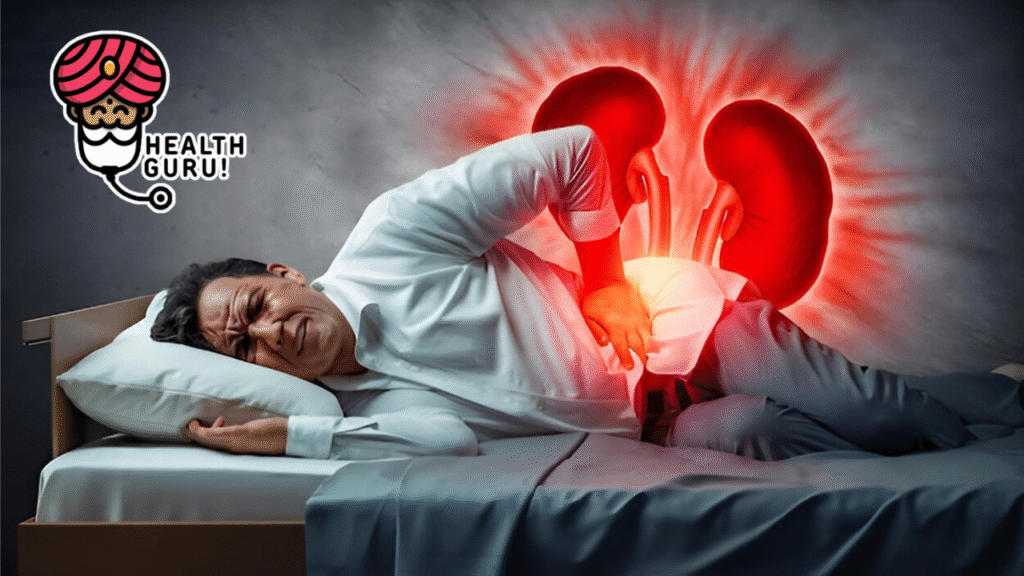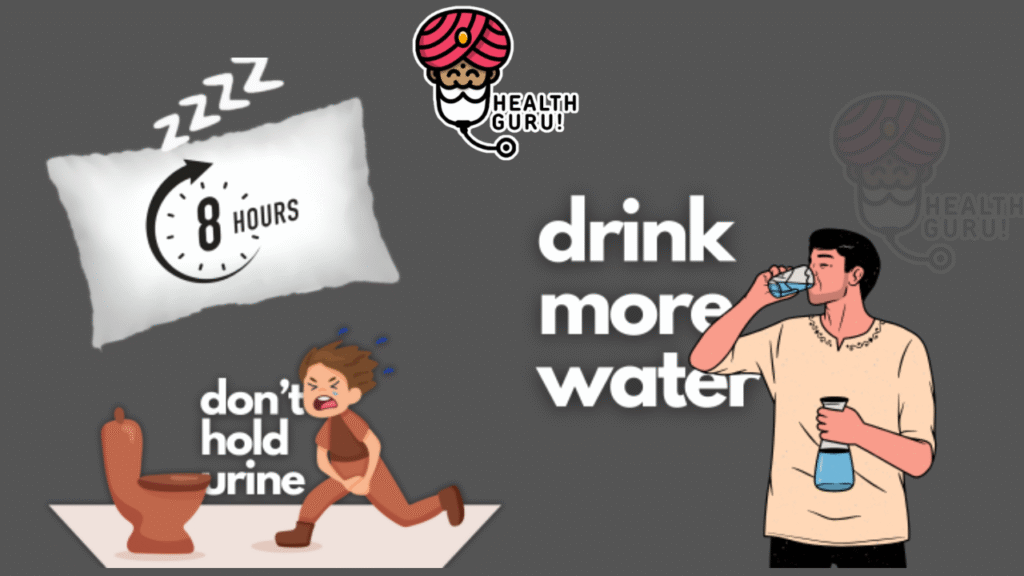A kidney infection or pyelonephritis, is a serious condition that impacts the upper part of the urinary tract.It often starts as a mild urinary tract infection (UTI) in the bladder and travels up the ureters to the kidneys. If ignored, it can lead to severe pain, fever, and dangerous complications like kidney failure or sepsis.
While anyone can develop this infection, it’s more common in women, pregnant individuals, and those with underlying conditions like chronic kidney disease. It’s important to recognize early symptoms like back pain, cloudy urine, and nausea. Prompt treatment is key to preventing lasting damage and restoring normal kidney health before it worsens.
What is a Kidney Infection (Pyelonephritis)?
A kidney infection, or pyelonephritis, is a type of urinary tract infection (UTI) that starts in your bladder and travels up the ureters to one or both of your kidneys. The kidneys are part of the upper urinary tract, and when harmful bacteria invade, it can lead to severe pain, fever, and possible complications like kidney failure or chronic kidney disease if untreated.
Most often, bacteria from your bowel cause these infections. When you don’t empty your bladder fully or ignore signs of a bladder infection, it gives germs a chance to climb up and infect your kidneys.
What is Another Name for Kidney Infection?
In the medical world, a kidney infection is called pyelonephritis. It sounds complicated, but it simply means inflammation of the kidney caused by bacteria or, sometimes, a virus. Unlike a mild bladder infection, pyelonephritis affects deeper tissues in the kidney, making it much more serious.
Some people confuse bladder infections with kidney infections because both are types of urinary tract infections (UTIs). However, the difference is based on where the condition occurs and how severe it is. A kidney infection often needs immediate medical help.
How Common Are Kidney Infections Worldwide?
Each year, millions of people suffer from urinary tract infections, and about 200,000 of them in the United States end up hospitalized with kidney infections. They occur more frequently in women, largely because of their anatomy, but men, children, and seniors aren’t spared either.
Though it’s a global health concern, it’s more common in regions where access to clean water and proper hydration and urinary health habits are limited. Good bathroom habits and awareness can reduce risks dramatically.
Who is at Higher Risk of Developing a Kidney Infection?
Some individuals are at a higher risk of developing kidney infections. If you’re female, pregnant, or have a urinary tract blockage like a kidney stone or an enlarged prostate, your risk increases. Conditions such as vesicoureteral reflux in children and issues with the immune system can also increase the risk.
People with spinal cord injuries and UTI issues, those with diabetes, or anyone experiencing frequent recurrent kidney infections should stay alert. Ignoring these risk factors can lead to severe problems.
What are the Possible Complications of Kidney Infections?
If left untreated, kidney infections can lead to serious complications. Including high blood pressure, kidney scarring, and even kidney failure. In extreme cases, the infection can spread into your bloodstream, causing sepsis, a life-threatening condition.
According to medical experts, those with weakened immunity or previous urinary tract problems have a higher risk of developing complications from an untreated infection. Quick action is crucial.
Symptoms & Causes of Kidney Infection (Pyelonephritis)

Spotting kidney infection symptoms early can save you from discomfort and hospital visits. Let’s go over them.
What Are the Common Symptoms of a Kidney Infection?
Typical indicators often involve elevated body temperature, shivering, and discomfort localized in the lumbar region, flank, or pelvic zone. Urine may turn cloudy, dark, bloody, or smell bad. Many also experience frequent, painful urination, along with nausea or vomiting.
For women, early signs of pyelonephritis frequently mirror urinary tract infection symptoms such as urinary urgency or burning. If ignored, the bacteria move upward causing serious discomfort and risk to both kidneys.
When Should You Seek Immediate Medical Help?
You should see a doctor if you notice any of the above signs, especially if you have a high fever, confusion, or severe pain. Such manifestations could signal septic complications stemming from renal infection, requiring immediate medical intervention to prevent fatal outcomes.
Gestational pyelonephritis may endanger maternal and fetal health, necessitating prompt treatment to mitigate pregnancy-related complications. Immediate treatment with antibiotic treatment and sometimes intravenous (IV) fluids may be required to avoid serious outcomes.
What Causes Kidney Infections?
Primary renal infections typically originate from gut microbiota migrating into the urethral pathway and colonizing urinary structures. Untreated cystitis may ascend through the ureteric passages, eventually infiltrating renal tissues and triggering systemic inflammation. Less commonly, hematogenous transmission allows pathogens from distant sites to invade nephritic systems via circulatory pathways.
Dehydration, poor bathroom habits, and ignoring UTI signs can increase your chances. In rare cases, surgery or underlying health problems contribute to infections.
Are There Any Lifestyle Factors That Increase the Risk?
Yes — poor hydration and urinary health, delaying urination, and preventing urinary tract infections the wrong way can all up your risk. In women, wiping from back to front, holding urine for too long, or frequent sexual activity without urinating afterward can contribute.
Men with an enlarged prostate or urinary tract blockage like a kidney stone are also vulnerable. Keeping your urinary system clean and healthy is key.
Diagnosis of Kidney Infection (Pyelonephritis)
When you suspect a kidney infection, prompt diagnosis is crucial.
How Do Healthcare Professionals Diagnose a Kidney Infection?
Doctors determine a diagnosis by examining your health history, physically inspecting symptoms, and utilizing medical testing procedures. For others, checking symptoms and ordering lab tests is standard.
Quick diagnosis prevents complications from untreated kidney infection, keeping you out of danger.
What Tests Are Used to Confirm the Diagnosis?
To confirm, doctors rely on urinalysis, urine culture, blood tests, and sometimes imaging tests like a CT scan, MRI scan, or ultrasound for kidney health.
| Test Name | Purpose |
| Urinalysis | Detects blood and white cells in urine |
| Urine culture | Identifies bacteria causing infection |
| Blood tests | Checks for severe infection and kidney function |
| Imaging (CT, MRI, Ultrasound) | Looks for stones, blockages, or damage |
Can Kidney Infections Be Misdiagnosed?
Sometimes, yes. Kidney infection symptoms can mimic other illnesses like kidney stones or muscle strain. That’s why proper testing, including what tests diagnose kidney infection, is essential for accurate treatment.
Misdiagnosis delays healing and can lead to chronic kidney disease if not corrected quickly.
Treatment & Management of Kidney Infection (Pyelonephritis)
Thankfully, most kidney infections are treatable when caught early.
Can Home Remedies or Natural Treatments Help?
While proper antibiotic treatment is necessary, you can support recovery by staying hydrated, resting, and using natural remedies for kidney infection like cranberry supplements for UTI and warm compresses for pain.
Does cranberry juice help kidney infections? Not cure them — but it may help prevent future ones by stopping bacteria from sticking to urinary tract walls.
How Long Does Recovery Usually Take?
Recovery typically takes about one to two weeks with the right care. Recovery time after kidney infection varies, but you should feel better after a few days on antibiotics. Full recovery can stretch longer if complications arise.
Ignoring symptoms or stopping medicine early risks antibiotic resistance, so finish your prescribed dose completely.
Eating, Diet, & Nutrition for Kidney Infection (Pyelonephritis)
Your diet can help prevent UTIs, though it won’t cure a kidney infection on its own.
How Can Diet Help Prevent or Manage Kidney Infections?
Preventing bladder infections naturally includes drinking plenty of water, avoiding sugary drinks, and maintaining good hydration and urinary health. Foods rich in vitamin C and antioxidants support kidney function and may reduce the risk of infection.
A diet low in salt, processed foods, and alcohol helps ease kidney strain.
Which Foods and Drinks Should Be Avoided?
Stay away from alcohol, caffeine, and spicy or acidic foods during infection. These can irritate your upper urinary tract and bladder. Limiting sugary snacks also helps lower the chances of bacteria growth.
Does adequate hydration play a role in preventing or managing kidney infections?
Yes — water is your best friend here. Is there a specific daily water intake that helps prevent kidney problems? Aim for 8–10 glasses daily, more if you’re active or live in a hot area. Good hydration flushes bacteria from the urinary tract.
Are There Specific Herbal Teas or Drinks Beneficial for Kidney Health?
Some herbal teas like parsley, chamomile, and marshmallow root can help soothe the urinary system. Though not a cure, these drinks support recovery and ease discomfort.
Can a kidney infection heal on its own? Rarely. Always seek medical help for proper treatment.
Conclusion
A kidney infection is more than just a simple urinary tract infection (UTI) — it’s a serious health issue that can lead to kidney failure, sepsis, and long-term damage if ignored. By understanding the symptoms of kidney infection in females and males, recognizing when to seek help, and staying mindful of risk factors like bladder infection, kidney stone, or vesicoureteral reflux, you can protect your kidney health.
Remember, small steps like staying hydrated, practicing healthy bathroom habits, and using cranberry supplements for UTI prevention may help lower your risk. Always consult a doctor when symptoms arise, and never rely on home remedies alone for serious infections. Your kidneys deserve care — keep them safe!
FAQs:
Can I detect a kidney infection myself?
Common indicators are fever, chills, pain near the ribs or lower back, and changes in urine. However, only a lab test can officially diagnose it.
What can be mistaken for a kidney infection?
It’s often confused with a bladder infection, kidney stone, or muscle strain, as symptoms like back pain and nausea overlap.
What part of the body hurts when you have a kidney infection?
You’ll typically feel a sharp or dull ache in your lower back, just below the ribs, on one or both sides.
What are the first signs of kidney problems?
Early signs include fatigue, swelling in the ankles, foamy urine, and frequent or painful urination.
Are there home methods to check if my kidneys are healthy?
Monitor your urine color, stay hydrated, and track symptoms. Home urine test kits can check protein or blood levels but aren’t a substitute for medical tests.



Pingback: How To Deal with Excessive Blood Stress - Health Guru